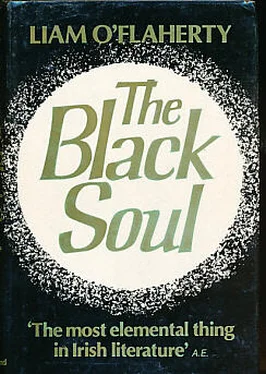He locked himself in his room all the day, lying on the bed on his back looking at the ceiling. Little Mary called him to his midday meal, but he growled at her to leave him alone. Then when darkness began to fall he left the house and went into Derrane’s shebeen at the eastern end of the village. Derrane’s kitchen was empty that night. All the people were at the shore salving the wreck of the Norwegian ship. He sat in a corner by the fire drinking glass after glass of potheen. Derrane’s wife, an inquisitive, loose-tongued woman, tried to draw him into conversation, asking him what did he think of the women of Rooruck. He did not reply, but she kept on talking after the manner of women.
At last she was saying, ‘And sure it’s the hand of God …’ when the Stranger flung his glass into the fire and jumped to his feet.
‘May the devil devour both you and God,’ he yelled, frothing with rage. The woman screamed, and he danced around the room shouting, ‘Yes, to hell with God. To hell with Him, I say. What do you know about the fool?’ Then he rushed out of the house and staggered up the boreen to Red John’s, shouting. Little Mary came running down to meet him and dragged him indoors.
A group of women gathered outside the gate of Red John’s yard listening to the sounds of quarrelling that came from the house.
‘Lord save us, it’s murder,’ said one.
‘Let somebody go to the shore for the men,’ said another.
Then Red John came rushing from the cabin, his forehead bleeding from a long cut that reached from the right eye to the right temple. The women shrieked and crowded about him.
‘What has come to you?’ they gasped.
Red John stood for a few moments spluttering and waving his hands in the air.
‘Police, police,’ he yelled. ‘The son of misfortune came in blaspheming and I tried to send him from the house and the loose woman on whom I put a ring gave me this. Police, police.’ And he rushed away for his pony. He rode madly into Kilmurrage for the police, but passing the schoolmaster’s house he got afraid. He dismounted from his pony and let it wander home alone. Then he went across the crags to Branigan’s shebeen in Kilmillick. He spent the night there drinking. The first streaks of the grey dawn were beginning to light the crags about Rooruck when he crept into his cabin and sat by his bed, shivering. He could hear his wife crooning in the Stranger’s room, as if she were rocking a child.
‘Ho-wa, ho-wa my pulse, white love of my heart. Ho-wa, ho-wa, brilliant gem of gladness. Ho-wa.’
He listened with open mouth.
‘Ha,’ he said fearfully, his hand on the white bandage that covered his wound, ‘he has put a spell on her. So he has.’ Hurriedly he put an oaten loaf in a cloth and left the cabin to look for wreckage.
The Stranger slept through the day. It was his first refreshing sleep since he had come to Inverara. Little Mary moved noiselessly about the cabin. Now and again she stood at her cabin door and looked longingly out towards the mainland. She could see it distantly when the mist broke, scattered by the breezes that blew intermittently over the green sea. She would go into the darkened room where he lay and look at his face, gentle and childish in sleep. Once she bent down and caressed his hair and his forehead with her lips.
The Stranger, sleeping, dreamt that a fairy had touched him. He kept dreaming a long time of beautiful women, with roses entwined in their black hair, kissing his lips. Then he awoke and saw only a peasant woman standing by his bed. The consciousness of his degradation swept back to him. He swallowed a cup of hot tea, dressed and went out. Night was falling in a thick mist that coloured everything pale blue. He felt a dryness in his throat.
‘Hell,’ he said, ‘I must get somebody to talk to. It’s awful being alone like this among yokels who only stare with open mouths when a man talks to them. I wish I hadn’t come here.’ But trudging along the wet road, the ends of his oilskin coat swishing damply against his legs, he shuddered as he thought of staying in Dublin ‘among so many people that don’t seem to care a damn.’ He could see that evening he went to Dr. McCarthy and said that he couldn’t sleep. ‘Hey, my boy, can’t sleep, eh?’ cried McCarthy, his fat stomach puffing in and out as he paced up and down the hearthrug. ‘You say you are working in the library. Like the work?’ ‘I hate it.’ ‘Any money left?’ ‘About two hundred.’ ‘Well, get to blazes out of Dublin then. Go out to the west and catch fish. Do you more good than cataloguing books. Out with ye, as quick as lightning.’ The tramcars sounded in his ears that evening as he rushed away from the doctor’s as loud as an artillery barrage. He hardly breathed peacefully until he left the Broadstone Station next morning. And now …
‘Damned if I’m going back again,’ he muttered. ‘Some day I’m going to throw myself down from that cliff and be done with it. By all the gods, I will. You see if I don’t.’
Then he heard the sounds of music as he was approaching John Carmody’s public-house at the cross-roads above the beach at Coillnamhan. He stopped dead in the road and listened.
Night had fallen. It was bitterly cold, but there was no wind. The wind was drowned by the wet fog, that came like a great blight from the mountains on the mainland to the north. He could dimly see the lights of the publichouse, a squat one-storied concrete building on a slope a little back from the road. John Carmody had built it the year before. It looked as incongruous in the surroundings as the electric railways at Niagara Falls. And the sounds of wild music came through its windows. The music had a peculiar effect on the Stranger. Music of any kind always maddened him with a sad happy madness. It affected him in the bowels. He often cried with the sadness of the thoughts that it inspired within him. At other times it made him want to kill. Now as he listened to the rough twanging of the accordion he was wrapped in an ecstasy of sadness.
He walked up a bypath to the house over trodden grass, avoiding the road, lest he should lose the sound of the music. He tripped over an empty barrel and fell against the door. The music stopped suddenly. Somebody jumped to his feet within and shouted, ‘God with you.’ Then the door opened and he entered the kitchen.
The kitchen covered half the floor space of the house. To the right was a counter cut into the partition, and behind the partition was a room lined with shelves of black-brown bottles and green bottles. Several barrels were pushed back, their round heads over the counter. On the counter John Carmody was leaning smoking a pipe, while his wife wiped a pint mug behind him. Around the fire on the hearth and on wooden forms by the wall a number of peasants sat drinking and smoking. Two of them had been dancing when the Stranger entered. Another group had been listening to John Carmody discussing politics. For the good man, even though he was now nearing middle-age and had become, as he himself said, a ‘bourgeois’ (a word the peasants understood to mean ‘an enemy of God’), he still liked to preach Socialism when he was in a good humour and slightly intoxicated.
‘I’ll make you fellahs drink out of a trough,’ he would say, ‘if you don’t get busy and organize to socialize the land and industry, and do away with the priests.’
And the people just thought that he was a harmless poor man and well-meaning.
There was silence when the Stranger entered.
‘Who is that fellah?’ said John Carmody to a man who stood beside him.
The man bent his mouth close to Carmody’s ear and whispered:
‘That’s Red John’s lodger. They say he’s gone in the head. We call him the Stranger.’
‘Go away, you galoot,’ said Carmody. ‘I heard about him. If you fellahs were as cracked as he is you wouldn’t be the bloody fools you are.’
Читать дальше












